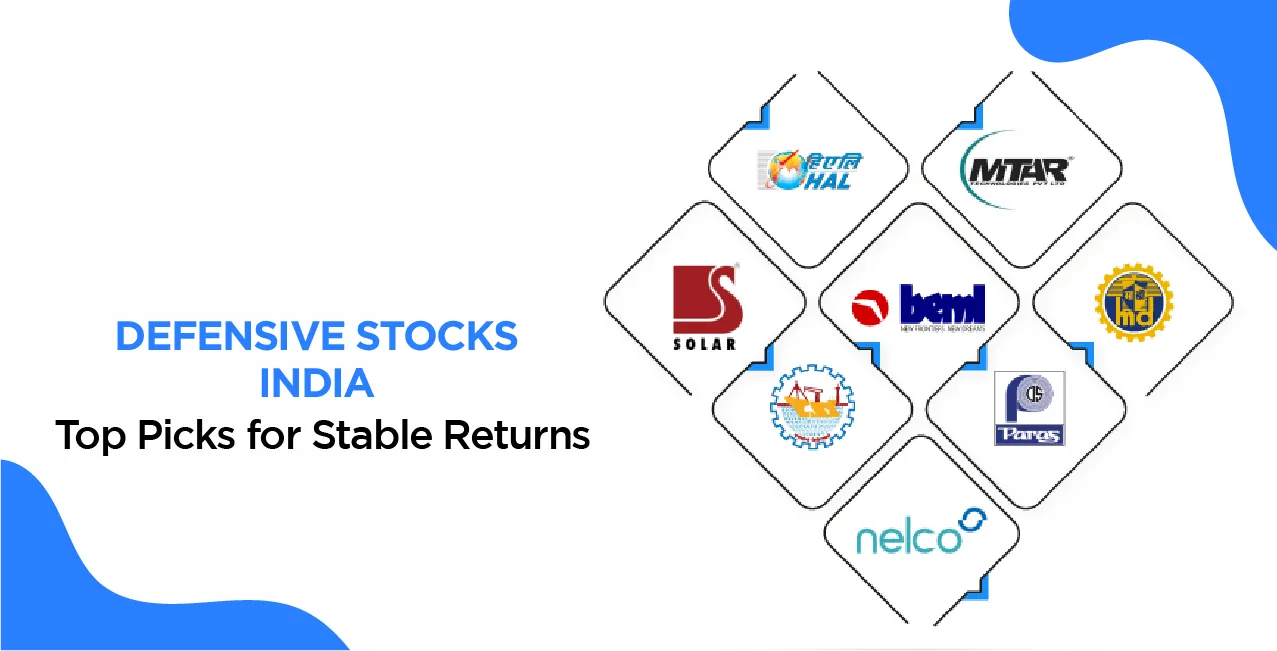Defensive Stocks India – Top Picks for Stable Returns

Check Your Loan Eligibility Now
By continuing, you agree to LoansJagat's Credit Report Terms of Use, Terms and Conditions, Privacy Policy, and authorize contact via Call, SMS, Email, or WhatsApp
Defensive stocks in India are shares of companies that provide essential goods or services with steady demand, irrespective of market or economic conditions.
Investors like Rajesh, an experienced market participant, have found value in these stocks for stability. For example, Rajesh holds shares in Hindustan Unilever, which offers products like soaps and detergents that remain in demand even during slowdowns. With a dividend yield of 1.81% as of April 2025, HUL has proven to be a reliable income-generating stock.
Rajesh also invests in NTPC, India's largest power generation company, known for its stability. With a market capitalisation of 3.51T INR and a dividend yield of 2.05%, NTPC provides consistent returns, especially during uncertain economic times.
Additionally, Rajesh’s holdings in Cipla, a leading pharmaceutical company with a dividend yield of 0.86%, have remained steady despite market fluctuations.
By focusing on defensive stocks in India, Rajesh has managed to preserve capital while generating consistent returns, especially during volatile periods, highlighting how these stocks offer stability in an unpredictable market.
What Are Defensive Stocks India, And Why Invest in Defensive Stocks In India?
What are Defensive Stocks India?
After a few months of exploring the stock market, Priya, a 26-year-old software engineer from Bengaluru, decided to build a portfolio focused on stability and consistent returns. She was drawn to defensive stocks of Indian companies that provide essential goods and services with steady demand, regardless of economic conditions.
Her first pick was Hindustan Unilever (HUL). At the time, HUL's stock was trading at ₹2,379, with a dividend yield of 1.92%. Priya appreciated the company's strong brand portfolio and its ability to deliver consistent dividends.
Next, she considered NTPC, India's largest power generation company. The stock was trading at ₹364.55, offering a dividend yield of 2.26%. Priya was impressed by NTPC's stable earnings and government backing, making it a reliable addition to her portfolio.
Lastly, Priya invested in Cipla, a leading pharmaceutical company. With a share price of ₹1,511.10 and a dividend yield of 0.86%, Cipla provided her with exposure to the healthcare sector, known for its resilience during economic downturns.
Through these investments, Priya aimed to achieve a balanced portfolio that could weather market volatility while providing steady income.
Reasons To Invest In Defensive Stocks In India
Let’s say Arjun is 29 years old and works as a financial analyst in Bengaluru. He wanted to create a strong and safe investment plan by putting his money into areas that are stable for a long time, supported by the government, and that give steady profits. After thorough research, he identified Hindustan Unilever (HUL), NTPC, and Cipla as prime candidates in the consumer staples and utilities sectors.
Read More – The Safest Investment Options During Economic Uncertainty
1. Steady Government Support and Sector Stability
Arjun recognised that companies in essential sectors like FMCG, power, and pharmaceuticals often benefit from consistent government policies and demand, even during economic downturns. These sectors provide products and services that remain in demand, ensuring revenue stability.
Company | Sector | Government Support | Stability Factors |
Hindustan Unilever | FMCG | High | Essential consumer products |
NTPC | Power Generation | High | State-owned power is a basic necessity |
Cipla | Pharmaceuticals | Moderate | Essential medicines, healthcare demand |
2. Consistent Long-Term Returns
Upon analysing historical performance, Arjun noted that these companies had delivered steady returns over the years, showcasing their resilience and the compounding potential of their stocks.
5-Year Stock Performance
Company | 5-Year Return (%) |
Hindustan Unilever | 6.00 |
NTPC | 285.60 |
Cipla | 153.45 |
3. Attractive Dividend Yields
Arjun was particularly drawn to the dividend yields offered by these companies, which provided a reliable income stream:
Dividend Yields
Company | Dividend Yield (%) |
Hindustan Unilever | 1.78 |
NTPC | 2.07 |
Cipla | 0.86 |
4. Technical Indicators Suggesting Positive Momentum
Arjun utilised technical analysis to time his investments effectively. He observed that the moving averages and support-resistance levels of these stocks indicated positive momentum, aligning with his investment strategy.
5. Diversified Exposure within Defensive Stocks India
By investing in a mix of FMCG, power, and pharmaceutical companies, Arjun achieved diversified exposure within defensive sectors, balancing risk and ensuring steady returns.
Sector Diversification
Company | Sector | Strategic Advantage |
Hindustan Unilever | FMCG | Essential products, strong brand |
NTPC | Power Generation | State-owned, reliable power supply |
Cipla | Pharmaceuticals | Essential medicines, global presence |
Arjun's approach to investing in defensive stocks highlights the importance of selecting companies with strong fundamentals, consistent performance, and attractive dividend yields to build a resilient investment portfolio.
Key Factors Affecting Defensive Stocks In India
Let's consider the example of Aditi, a 32-year-old investment advisor from Pune, who wanted to build a stable and low-volatility portfolio during a period of market uncertainty in 2022. She allocated ₹5,00,000 towards defensive stocks in India, focusing on companies in the FMCG and pharmaceutical sectors, known for their resilience during economic downturns. She made this decision after evaluating the key factors that could impact the performance of defence stocks:
Factor | Impact |
Market Conditions | Defensive stocks in India tend to outperform during economic downturns and high volatility as investors seek stability and capital preservation. |
Revenue & Earnings | Stable demand leads to consistent revenues and earnings, making these stocks reliable even when broader markets are uncertain. |
Dividend History | Companies with a solid history of regular dividends are attractive for income investors and reflect strong financial health. |
Debt & Positioning | Lower debt and strong competitive advantages help defensive companies remain resilient during financial stress or economic slowdowns. |
Valuation (P/E Ratio) | Overvalued defensive stocks in India may limit upside potential; reasonable P/E ratios are essential to avoid paying a premium for stability. |
Dividend Yield | A higher yield increases the stock’s appeal, particularly for conservative investors looking for regular income. |
Interest Rates | Rising interest rates may reduce the attractiveness of defensive stocks India as fixed-income alternatives become more appealing. |
Profitability Impact | Higher borrowing costs in a rising rate environment can affect profitability, even for stable companies in defensive stocks in India. |
Best Defensive Stocks India
Note: This data has been taken from the official website of Google Finance.
Stock Name | Market Cap | P/E ratio | Dividend Yield (%) | 1 year return (%) |
Share India Securities Ltd | 34.45B INR | 8.67 | 0.82 | 53.59 |
NMDC Ltd | 586.24B INR | 9.06 | 4.20 | 14.79 |
Natco Pharma Ltd | 149.93B INR | 8.03 | 0.72 | 18.19 |
West Coast Paper Mills Ltd | 29.78B INR | 7.70 | 1.77 | 26.88 |
Pudumjee Paper Products Ltd | 11.77B INR | 10.27 | 0.49 | 84.47 |
KNR Constructions Ltd | 65.65B INR | 5.40 | 0.11 | 10.21 |
DB Corp Ltd | 44.97B INR | 10.20 | 7.94 | 12.44 |
Andhra Paper Ltd | 15.28B INR | 12.78 | 2.60 | 23.56 |
Panama Petrochem Ltd | 22.85B INR | 11.22 | 1.59 | 11.05 |
Indian Metals and Ferro Alloys Ltd | 34.58B INR | 8.28 | 2.34 | 7.29 |
Factors To Consider Before Investing In Defensive Stocks In India
Meera, a 34-year-old risk-conscious investor from Pune, was looking to add stability to her portfolio during a period of high market volatility. After consulting her financial advisor and researching sector trends, she turned her attention to defensive stocks of Indian companies that offer essential goods and services, such as consumer staples, utilities, and pharmaceuticals. One stock that caught her attention was Hindustan Unilever Ltd. (HUL), a giant in the FMCG space.
Factors Meera Considered Before Investing in Hindustan Unilever Ltd. (HUL)
1. Resilience During Market Volatility
Meera noticed that HUL remained relatively stable even during the 2020 pandemic-driven crash, losing less value compared to other sectors and rebounding quickly.
Factor | HUL (2020) Performance | Significance |
Pandemic Impact | -8% during the March crash | Lower drawdown vs. broader market (-23%) |
Recovery Timeline | 2.5 months | Quick bounce-back due to steady demand |
2. Steady Revenue and Earnings Growth
HUL showed consistent revenue growth over multiple quarters, driven by daily-use products like soaps, toothpaste, and detergents.
Quarter (FY24) | Revenue (₹ Cr) | YoY Growth (%) |
Q1 | 15,148 | +6.1% |
Q2 | 15,377 | +4.6% |
Q3 | 15,577 | +3.5% |
This consistency gave Meera confidence that HUL could deliver even in tough economic conditions.
3. Dividend Stability
One major draw was HUL’s regular dividend payouts, which Meera considered a form of passive income.
Year | Dividend per Share (₹) | Dividend Yield (%) |
2022 | 42.00 | 1.26 |
2023 | 39.00 | 1.17 |
2024 | 40.00 | 1.18 (projected) |
4. Valuation and Debt Position
Meera evaluated HUL’s valuation and balance sheet before investing. Although the stock had a relatively higher P/E ratio (~55x), its zero-debt status and consistent margins supported the premium valuation.
Metric | Value | Remarks |
P/E Ratio | 55.4 | High, but backed by brand strength |
Debt-to-Equity | 0.00 | Zero debt, very low financial risk |
Operating Margin | 22.8% | Efficient operations |
5. Sector-Wide Confidence: Diversification Across Defensive Names
Instead of putting all her funds into one company, Meera diversified across defensive stocks, adding ITC Ltd. and Cipla to her portfolio for broader exposure.
Company | Sector | Reason for Inclusion |
HUL | FMCG | Strong brand, steady earnings |
ITC | Consumer Products | High dividend, FMCG growth, lower volatility |
Cipla | Pharma | Export growth, stable domestic demand |
The Outcome
Meera invested ₹1,50,000 across these three stocks in April 2023. By April 2024, her portfolio had appreciated by 18.5%, supported by market stability and sustained consumer demand. While other sectors saw large fluctuations, her investments in defensive stocks provided reliable growth and peace of mind.
Challenges & Risks In Defensive Stocks
Risk Factor | Description | Illustrative Example |
Low Growth Potential | Defensive stocks often show slower growth compared to cyclical or tech sectors. | HUL's stock price grew ~2% YoY in FY24, while tech companies like Infosys grew ~3%. |
Overvaluation | Stable earnings lead to high demand, often pushing valuations above fair value. | Nestle India is trading at a P/E of 71.24, significantly higher than the sector average. |
Interest Rate Sensitivity | Rising interest rates can make fixed-income assets more attractive than stocks. | As the RBI raised repo rates in 2022, utility stocks like NTPC saw limited investor interest. |
Regulatory Risks | Price controls or regulations can hurt margins in sectors like healthcare. | Cipla faced margin pressure after the drug price caps were introduced by the NPPA. |
Competitive Pressure | New market entrants or pricing wars can erode market share. | ITC’s FMCG division faced stiff competition from regional players in packaged foods. |
Currency Fluctuations | Some defensive companies rely on exports; a weak rupee can raise input costs. | Dr. Reddy’s Laboratories saw reduced margins due to rising import costs of raw materials. |
Stagnation in Demand | Though stable, demand may saturate over time, limiting revenue growth. | Demand for traditional soaps from HUL remained flat despite price cuts. |
Future Of Defensive Stocks In India
In 2025, as global economic uncertainties and market volatility persist, India’s defensive sector stocks continue to attract investors seeking stability and consistent returns. These sectors—FMCG, pharmaceuticals, utilities, and consumer staples—tend to perform well regardless of market cycles. Let’s see Ravi, a 35-year-old risk-averse investor, as he navigates the defensive stock landscape.
Ravi’s Defensive Investment Journey
Also Read - Best Long-Term Stocks to Invest in Safe & Profitable
In early 2023, Ravi invested ₹1,50,000 in three defensive stocks: Hindustan Unilever (HUL), Dr. Reddy’s Laboratories, and NTPC. His allocation was guided by his goal of wealth preservation with moderate growth.
Company | Sector | Investment | Share Price in 2023 | Share Price in 2025 | Return |
Hindustan Unilever Ltd | FMCG | ₹50,000 | ₹2,576 | ₹2,417 | -6.14% |
Dr. Reddy’s Labs | Pharmaceuticals | ₹50,000 | ₹4,000 | ₹4,800 | +20% |
NTPC Ltd | Utilities | ₹50,000 | ₹169 | ₹360 | +113% |
Total Portfolio Value | – | ₹1,50,000 | – | – | ₹2,13,439.60 |
Why Defensive Stocks Matter in 2025
1. Steady Demand
Products and services in sectors like FMCG and utilities are essential, ensuring consistent revenue streams—even in economic downturns.
2. Resilience During Volatility
Defensive stocks typically experience lower price fluctuations, making them suitable for conservative investors during uncertain times.
3. Dividend Income
Many companies in these sectors offer regular and attractive dividends, adding to the total return for long-term investors.
Key Defensive Sectors and Leading Companies
Sector | Company | Significance |
FMCG | Hindustan Unilever | Strong brand portfolio, stable demand across demographics. |
Pharmaceuticals | Sun Pharma, Dr. Reddy’s | Global presence, high R&D spend, essential product mix. |
Utilities | NTPC, Power Grid Corp. | High cash flow businesses are vital to infrastructure. |
Consumer Staples | ITC, Nestle India | Robust rural demand and pricing power. |
Market Insights and Forward Outlook
Despite fluctuations in broader markets in 2025, defensive stocks remain anchored by their stable earnings and dependable consumption trends. Rising rural income, healthcare awareness, and infrastructure expansion further support these sectors.
Recent Trends:
Trend | Explanation |
Strong Rural Demand | FMCG and staples companies are expanding distribution in rural markets. |
Policy Support for Healthcare | Government schemes are boosting healthcare access, aiding pharma growth. |
Power Demand Growth | Energy consumption is rising with industrial and digital expansion. |
Pricing Power | Brand loyalty allows companies to pass on input cost increases. |
Who Should Invest In Defensive Stocks in India?
Defensive stocks in India, known for their stability and resilience, are ideal for certain investors who prioritise consistency and risk mitigation over aggressive growth. Below is a breakdown of who should consider adding them to their portfolio.
1. Long-Term, Conservative Investors
Defensive stocks offer predictable earnings and dividends, making them a smart pick for those seeking low-risk, long-term wealth creation.
Why Defensive Stocks India Suit Them | Example |
These stocks often belong to sectors like FMCG, utilities, and pharma, which see consistent demand, ensuring regular returns over time. | A ₹1,00,000 investment in ITC in 2020 has yielded stable dividend income plus 60% capital appreciation by 2025, ideal for patient investors. |
2. Retirees and Income-Focused Investors
With steady cash flows and regular dividend payouts, defensive stocks are attractive to investors who prioritise income generation.
Why Defensive Stocks India Suit Them | Example |
Companies like NTPC and Power Grid offer consistent dividends, helping supplement retirement income without high risk. | NTPC has delivered a 5–6% dividend yield annually. A ₹10,00,000 investment in 2021 earns ₹50,000–₹60,000/year in dividends alone. |
3. Risk-Averse Investors in Volatile Markets
Defensive stocks in India are less susceptible to economic swings, offering portfolio stability during market downturns.
Why Defensive Stocks India Suit Them | Example |
FMCG and pharma sectors remain unaffected even during economic slowdowns, maintaining stock value better than cyclical sectors. | During the COVID-19 crash in March 2020, HUL fell only ~10%, compared to a 30 %+ drop in the Nifty 50 index. It quickly rebounded due to strong demand. |
4. First-Time Equity Investors
New investors often prefer stable sectors to get accustomed to stock market dynamics without facing wild volatility.
Why Defensive Stocks India Suit Them | Example |
The learning curve is smoother with companies that have strong fundamentals and consistent returns. | A new investor buying Nestle India in 2022 at ₹18,000 saw moderate and steady growth to ₹22,000+ by 2025, with minimal stress. |
5. ESG-Conscious Investors
Many defensive companies, especially in consumer goods and utilities, are advancing on the Environmental, Social, and Governance (ESG) front.
Why Defensive Stocks India Suit Them | Example |
These companies often lead sustainability initiatives, appeal to ethical investors, and benefit from ESG-focused fund inflows. | ITC has diversified into sustainable packaging, green hotels, and agri-sourcing. Its ESG practices are recognised by global rating agencies. |
How To Invest In Defensive Stocks In India?
Investing in defensive stocks in India can be a wise strategy for those seeking stability, consistent returns, and portfolio resilience during volatile market phases. These stocks typically belong to sectors such as FMCG, utilities, and healthcare, which remain in demand regardless of economic cycles. Here's a step-by-step guide to start your investment journey in defensive stocks in India.
1. Open a Demat and Trading Account
To buy defensive stocks in India, you’ll need a Demat and trading account.
Choose a Broker: Opt for a trusted brokerage platform such as Zerodha, Groww, Angel One, or Upstox.
Steps to Open an Account:
- Visit the broker's website or download their app.
- Provide necessary personal details such as name, PAN, Aadhaar, and bank account.
- Complete KYC (Know Your Customer) verification through online Aadhaar-based e-KYC or video verification.
- E-sign your application using an OTP sent to your Aadhaar-linked mobile number.
- Link your bank account to enable seamless fund transfers for buying stocks.
Ravi opens a Demat account with Angel One to start investing in stable companies like Hindustan Unilever and NTPC, two top defensive stocks in India.
2. Research Defensive Stocks
Before investing, conduct thorough research to understand which defensive stocks India align with your risk profile and goals.
Sector | Company | Key Strength |
FMCG | Hindustan Unilever (HUL) | Strong brand loyalty and pricing power |
Utilities | NTPC, Power Grid Corp | steady cash flows and high dividend yields |
Pharmaceuticals | Sun Pharma, Dr. Reddy’s | Consistent demand and export potential |
Consumer Staples | Nestle India, ITC | Rural penetration and essential products |
According to recent reports, ITC has not only posted strong Q4 numbers in 2025 but also maintained high dividend payouts, making it a preferred defensive stock in India.
3. Place Your Order
Once your account is set up and you’ve selected your preferred defensive stocks India, you’re ready to invest.
How to Buy:
- Log in to your broker's app or website.
- Search for the stock using the company name or ticker symbol (e.g., ITC, HUL).
- Click “Buy” and enter:
- Quantity of shares
- Price (use “Market” for instant buy or “Limit” to set a price)
- Quantity of shares
- Review and confirm your order.
Meena places a limit order to buy 10 shares of Nestle India at ₹21,000 each through the Groww app.
4. Monitor Your Investment
After purchasing defensive stocks in India, it's important to track and manage your portfolio.
to Stay Updated:
- Use your broker’s dashboard or mobile app to track stock performance.
- Watch out for quarterly results, dividend announcements, and industry updates.
- Follow news on inflation, consumer trends, and government regulations, which can affect sectors like FMCG and healthcare.
Final Thoughts: Should You Invest in Defensive Stocks in India?
If you're seeking a low-volatility, reliable, and income-generating investment approach, defensive stocks in India should definitely be part of your consideration. These stocks provide stability and consistent performance, even during market downturns, making them a strategic choice for long-term wealth building.
Why They Make Sense:
- Stability in Uncertain Times: Defensive sectors such as FMCG, utilities, and healthcare benefit from steady consumer demand, regardless of economic conditions.
- Regular Dividends: Most defensive stocks in India offer consistent dividend payouts, making them ideal for income-focused investors.
- Lower Risk Exposure: These stocks typically experience less price volatility, helping investors weather market corrections more comfortably
- Portfolio Diversification: Including defensive stocks, India in your portfolio can reduce overall risk and balance more aggressive investments.
Example: During the market turbulence of 2020–2022, while sectors like technology and banking saw sharp corrections, companies such as Hindustan Unilever, ITC, and NTPC maintained steady growth and continued to distribute dividends, highlighting the reliability of defensive stocks in India.
Other Stocks List | ||
About the author

LoansJagat Team
Contributor‘Simplify Finance for Everyone.’ This is the common goal of our team, as we try to explain any topic with relatable examples. From personal to business finance, managing EMIs to becoming debt-free, we do extensive research on each and every parameter, so you don’t have to. Scroll up and have a look at what 15+ years of experience in the BFSI sector looks like.
Subscribe Now
Related Blog Post
Recent Blogs
All Topics
Contents
Quick Apply Loan
Consolidate your debts into one easy EMI.
Takes less than 2 minutes. No paperwork.
10 Lakhs+
Trusted Customers
2000 Cr+
Loans Disbursed
4.7/5
Google Reviews
20+
Banks & NBFCs Offers
Other services mentioned in this article








